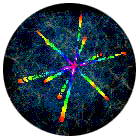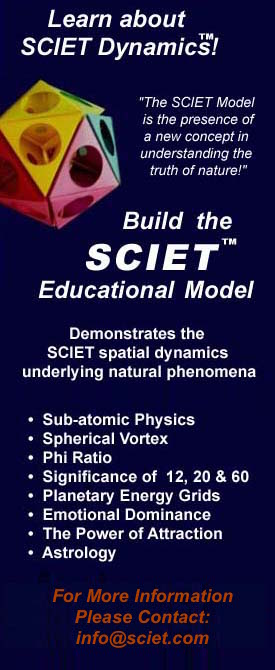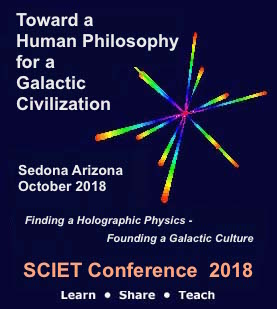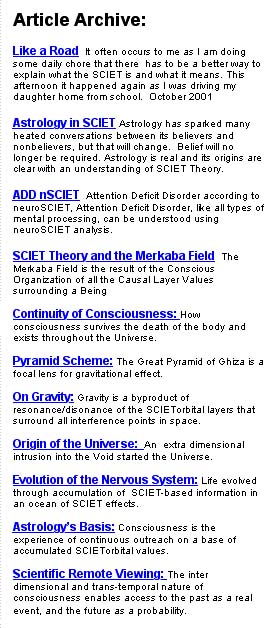|
|
 |
 |
 |
 |
 |
|
 |
|
|
|
|
|
|
|
The Philosophic Roots
.... the basic attitude of twentieth century physicists is that we shouldn't bother trying to understand the causal mechanisms underlying the equations. Doing so will get us -- in Richard Feynman's memorable description -- " 'down the drain' into a blind alley from which nobody has yet escaped." [10] Physics, then, is left as merely the manipulation of mathematical symbols describing subjective observer-processed appearances
An article by Travis Norsen, published June 2001 on the web by Objective Science.com, titled Mathematics vs. Matter: The Philosophic Roots of the Rejection of Physical Causation in 20th Century Physics does a nice job describing the why and how of Science's current philosophical quandary.
Working on SCIET Dynamics for almost three decades has left me out of the loop on such issues. SCIET Dynamics solves these problems up front with its Functional Cosmology.
Based on the notion that sufficient observable data is available to give rise to a purely mathematical construct able to not only to describe nature, but to begin with the void alone, the SCIET uses the power of visualization to explain ALL natural laws. This article illustrates the difficulty and entrenched opposition to such an idea
From Travis Norsen
In physics, the superficiality of post-modern philosophy takes the form of mathematical formalism divorced from any reference to causal mechanisms, i.e., equations whose referents in the physical world are unknown and not sought. Mathematics--the science of measurement-- is vital to physics; but, it should not comprise the totality of physics.
Mathematics vs. Matter: The Philosophic Roots of the Rejection of Physical Causation in 20th Century Physics
By Travis Norsen
March 2001
[OBJECTIVE SCIENCE.COM] Philosophy in the twentieth century is characterized by its essential superficiality. In every branch, contemporary philosophers explicitly renounce the basic content of their subject, leaving them with empty methodology applied to nothing. The result is logic divorced from concepts, concepts divorced from percepts, ethics without epistemology, epistemology without metaphysics -- in short, form without content.
Part 2 of 4
April 2001
[OBJECTIVE SCIENCE.COM] As I explained in part 1 of this series, the purpose of what follows is to identify the causes in philosophy of physicists' obsession with mathematical formalism -- and the incredible superficiality to which this leads. We will thereby also explode the myth that it was scientific discoveries that led physicists to reject the need for causal explanations of their formalisms. The rejection of the physical world in favor of mathematical formalism comes from the influence of two philosophers -- Plato and Kant -- and not from any 20th century scientific laboratory. Indeed, the Primacy of Mathematics attitude is nearly as old as Western Civilization itself. Let us, then, begin with the originator of the Primacy of Mathematics, the man who planted a seed which Plato turned into a complete philosophic system: Pythagorasin Ancient Greece.
Part 3 of 4
May 2, 2001
[OBJECTIVE SCIENCE.COM] [As I explained in Part 2 of this series,] the projection of the mathematical laws of nature into a higher or prior existence is an obvious expression of Platonism -- and a major source of the Primacy of Mathematics in contemporary physics. It is part of the reason why causal sequences involving the material world are scorned in favor of "elegant" mathematical formalism.
Part 4 of 4
June 2001
[OBJECTIVE SCIENCE.COM] [As I explained in Part 3 of this series,] the basic attitude of twentieth century physicists is that we shouldn't bother trying to understand the causal mechanisms underlying the equations. Doing so will get us -- in Richard Feynman's memorable description -- " 'down the drain' into a blind alley from which nobody has yet escaped." [10] Physics, then, is left as merely the manipulation of mathematical symbols describing subjective observer-processed appearances. |
|
.
Norsens conclusion demands of Physicists that they acknowledge that only Aristolelian concretes exist. It is a conclusion that presumes the absoluteness of material existence and the total disregard of the role of consciousness in scientific inquiry.
``...So what is needed to put physics back on the correct path? Clearly the first step is to reject the primacy of consciousness in all its forms, and all its consequences -- including especially the Primacy of Mathematics.
What is needed is to institute the primacy of existence fully and consistently, starting with the Aristotelian identification that only concretes exist. There are no floating properties, actions, relationships, or abstractions -- there are only entities with definite properties, etc. Identity is not something that is externally imposed on the material world: "Existence is identity." [12] Or, as Dr. Leonard Peikoff writes:
Causality, in the Objectivist viewpoint, is a fact independent of consciousness, whether God's or man's. Order, lawfulness, regularity do not derive from a cosmic consciousness (as is claimed by the religious "argument from design"). Nor is causality merely a subjective form of thought that happens to govern the human mind (as in the Kantian approach). On the contrary, causality -- for Objectivism as for Aristotelianism -- is a law inherent in being qua being. To be is to be something -- and to be something is to act accordingly. [13]
Hence, the properties and actions that are quantified in the mathematical laws of physics, must ultimately be understood as properties and actions of entities. Contrary to today's dominant view, a theory in physics is not merely a set of equations. Equations permit a description of actions and properties, but a complete theory should explain the actions as well, by giving a causal account of the physical processes involved. The examples mentioned in the introduction - the trajectories of planets in the sky, genetic inheritance, and the behavior of ideal gases -- should serve as a guide. In these examples, the observed mathematical regularity is not accepted as a final theoretical dead end, but is studied and eventually explained by the underlying structure and identity of the physical entities involved. This is the correct progression.
What is needed, in short, is a return to the type of physical explanations that dominated physics prior to the 20th century, and which still dominate in the philosophically more healthy sciences of chemistry and biology -- this time with the full philosophic proof of their propriety. Only this will allow physics to progress beyond its current state of mathematics-obsessed superficiality.
The discovery of a mathematical formalism which quantifies an observed regularity in nature is not an insight into some higher world, nor is it the most one can hope for in an observer-created universe. Rather, it is only the first step in a long road of explanation and understanding -- if only physicists will have the philosophical courage to follow it.
The SCIET is a mathematical formalism in this sense. It is a step in a new direction. Now let us follow that road to its logical conclusion...even if it totally destroys the Objectivism so cheriched by Travis Norsen.
Dane Arr
|
|
|
|
|
|




